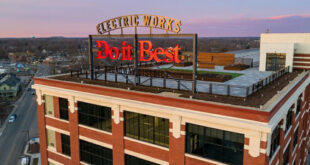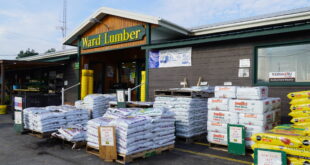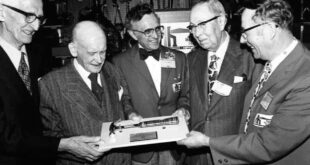At the beginning of this year, Orgill Inc. completed the next phase in its leadership transition. Boyden Moore took the reins of the Memphis-based distributor as its new president and CEO, while the man who formerly occupied that role, Ron Beal, moved into a new position as Orgill’s chairman of the board.
Over the past three decades, Orgill has grown from a regional distributor serving retailers throughout the mid-southern U.S. to become one of the largest distribution companies in the home improvement industry.
As Moore transitions into his new position, Hardware Retailing was given the opportunity to get his thoughts on where the company and the industry may be headed in the future.
Hardware Retailing (HR): Tell us a little bit about your background and what brought you to your position at Orgill.
Boyden Moore (BM): Most of my career has been in retail starting in home improvement, then grocery and apparel before returning to the industry in 2000 at Marvin’s in Alabama. Much of my experience in the industry has been as a customer of Orgill, first at Marvin’s and then working together with Orgill beginning in 2009 with Tyndale Advisors and Central Network Retail Group (CNRG).
I joined the management team at Orgill in 2015 as we further implemented the strategies of how Tyndale Advisors and CNRG could serve Orgill’s mission “to help our customers be successful.”
HR: You have a lot of retail experience. How do you think that gives you a bit of a different perspective in your current role?
BM: I do, but I’m not alone. Many of our leaders at Orgill have experience as retailers including Brett Hammers, John Sieggreen, Jeff Curler, Phillip Walker, Chris Freader, and I’m sure I’m leaving some out. It helps us really be customer-centered in our decision-making and deliver on our mission. Our team knows what it takes to be successful at retail and have lived it, experiencing both successes and failures. It’s amazing how well members of this team complement one another in retail experiences from small to large infrastructure, pro-focused to consumer-focused retailers, urban, suburban and rural businesses. I’d say our team has some of the best breadth and depth of knowledge among the independent channel. All of that enhances our ability to deeply understand and help our customers.
HR: As the new president and CEO of a venerable company like Orgill, what is on your to-do list for year one?
BM: Orgill is a very well-run company. I had the opportunity to spend a lot of time studying our business over the past year, visiting our distribution centers and talking with our logistics teams, going out to see our customers and working hard to understand their challenges and priorities and seeing firsthand how our sales team delivers value to our customers.
Our customers, owners and management team expect us to improve and get better every year. So the first order of business is to keep up with that pace of constant improvement. Our industry is always getting more competitive, retail is getting more complicated, especially around technology and marketing. Our team is doing some pretty exciting things to drive competitive advantages for our customers, and we see lots of opportunities for us to do more.
HR: What changes do you see taking place in the industry that will be major disruptors for independent retailers in the next three years?
BM: Well, e-commerce is certainly a big one. Amazon and Home Depot are leading the industry and setting new expectations among consumers. We need to find ways to help independent retailers keep up with the pace of change being set by these companies and the shifting demands of consumers.
Also, the use of technology in retail in general: to understand customers better; market more effectively and efficiently to them; leverage employees’ efficiency and drive a better customer experience. Delivering competitive insights in managing your business is also a huge potential disruptor. We are working to deliver these tools to our customers to help them grow and win in the industry.
HR: How is Orgill addressing these disruptors?
BM: We’re doing something I think is very unique. All of our customers are different, which requires a different approach than if you were developing a solution for one brand. We develop solutions for our customers using an approach we call “mass customization.” Our customers are involved in the design of these solutions, too. In the example of e-commerce, we started a symposium three years ago and invited customers working on their e-commerce strategies to share their experience, knowledge, successes, lessons, ideas and preferences as we worked to develop solutions at Orgill that could help everyone in their efforts. We then implement tests in our own stores at CNRG where we refine and improve the tools sharing our experience and best practices as we go.
CNRG is a test lab where we can develop solutions across different formats (hardware stores, home centers, pro retailers), different brands and different types of markets. Mass customization is required inside of CNRG’s multiple formats and brands, which gives us a platform to develop and test solutions in the market more broadly.
That same approach I described in our e-commerce solutions is being applied to the other technology opportunities in marketing, customer insight, employee productivity and business intelligence.
HR: What do you feel the core differences are between running a highly efficient, successful retail operation and one that is just bumping along?
BM: There are three things that come to mind for me and have been demonstrated as we’ve worked on CNRG: raving fans, pricing strategy and administrative overhead. The most successful retailers I’ve seen have created raving fans as their customer base, customers who absolutely love the store and team. This usually comes from great leadership and from hiring and training great people who also are raving fans about the business and their role in it.
Pricing strategy is another area where the most successful operations really stand out. This is an area where Orgill really delivers a very strong competitive advantage for our dealers. We have implemented Orgill’s more sophisticated pricing strategies in many of CNRG’s brands after acquisition and driven significant improvement in margin.
Administrative overhead is another area where I think the most efficient and successful retailers set themselves apart. Simplifying the supply chain is one area that we’ve implemented in CNRG’s brands that absolutely takes cost out of administrative expenses. Effective, affordable and efficient marketing solutions like brand-building tools and our BrandBase software we’ve developed for all of our customers. Scalable, effective and efficient technology solutions like we’ve developed for e-commerce and are refining with FanBuilder, a new customer loyalty program we’ve developed. We are currently working in the lab to deliver competitive advantages for all of our customers, and the progress I see our teams making is really exciting.
HR: Do you feel that every retailer has the ability to address those challenges?
BM: I do, and we’re doing all we can to help our customers do so.
 Hardware Retailing The Industry's Source for Insights and Information
Hardware Retailing The Industry's Source for Insights and Information








